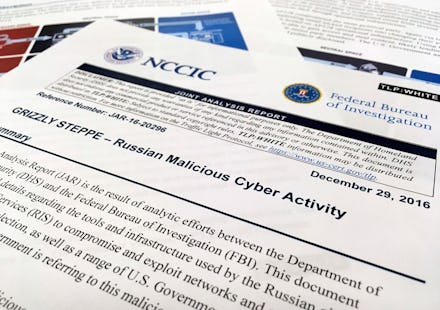FBI Director James Comey testifies that Russia hacked Republicans, too

Russian hackers infiltrated Republican data sources but didn't leak any of the information they culled, FBI Director James Comey told Congress Tuesday.
"There was evidence of hacking directed at state-level organizations, state-level campaigns and the [Republican National Committee], but old domains of the RNC, meaning old emails they weren't using. None of that was released," Comey told a Senate panel, according to CNN.
He also said there was no sign hackers had targeted current RNC computers or the campaign of President-elect Donald Trump.
Last Friday, federal authorities released a declassified version of a report that directly accused Russian President Vladmir Putin of ordering a campaign to influence the 2016 U.S. presidential election.
Putin specifically intended to bolster Trump and to "undermine public faith in the U.S. democratic process, denigrate Secretary [Hillary] Clinton and harm her electability and potential presidency," the report concluded.
U.S. analysts say much of the damaging material hacked from the Democratic National Committee and the Clinton campaign became public fodder for media reports via Julian Assange's WikiLeaks. Assange has denied playing into the hands of the Russians to destabilize the election and decried Friday's report as "misleading."
At Tuesday's hearing, Comey's stated refusal to declassify findings related to potential interactions between Trump associates and Russian agents rankled both his questioners and political observers at large.
"I think the American people have a right to know this," Oregon Democratic Sen. Ron Wyden told Comey, according to Politico. "And if there is a delay in declassifying this information and releasing it to the American people, and it doesn't happen before Jan. 20, I'm not sure it's going to happen."
Comey became a bugbear to both Clinton loyalists — and even some within his own department — for his handling of the investigation into the breaching of a private server the Democratic presidential nominee maintained in her home while head of the State Department.
He said while Clinton had been "careless" with sensitive material routed through the server and a private, nongovernmental email account, he would not recommend her prosecution.
Still, his eleventh-hour resurrection of the investigation shortly before Election Day enraged Clinton supporters: Critics said his public statements on reopening the case damaged her image with the public, even though he reiterated Clinton would not face charges just days before voters went to the polls. Clinton herself suggested Comey's timing deeply hurt her chances at the presidency.
On Tuesday, Comey's insistence that he was doing his job unconstrained by politics and wouldn't discuss any pending investigation raised eyebrows on the Senate panel:
During testimony, Reuters reported, Director of National Intelligence James Clapper said the "U.S. intelligence community's report concluding that Russia orchestrated hacks during the 2016 presidential campaign was based on a mix of human sources, collection of technical data and open-source information."
Shortly before the Friday release of the report, Trump, who has repeatedly flattered Putin on social media and expressed skepticism about intelligence leaders' assertion that Russians sought to meddle in the presidential contest, emerged from a long-awaited intelligence briefing.
In a statement, he insisted foreign cyberattacks had no effect on the outcome of his general election showdown with Clinton. Still, he pledged to organize a task force to generate ways to guard against such espionage in the future.